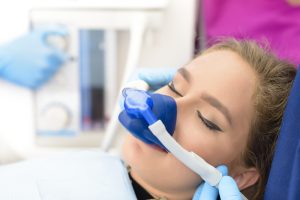

Dental Anxiety Tips and Strategies From Our Staten Island Dentists
Dental anxiety affects millions worldwide, causing them to avoid or postpone dental visits. It’s normal to feel a bit nervous before a dental appointment. However, excessive fear and anxiety can lead to serious oral health problems.
In this blog, our dentists will discuss various tips and strategies to help manage dental anxiety and improve oral health.
What Is Dental Anxiety?
Dental anxiety is fear associated with a dental setting and is a common condition that affects people of all ages. It can be caused by various factors, such as:
- Fear of pain
- Previous negative dental experiences
- A lack of control during procedures
Untreated dental anxiety can lead to serious oral health problems, such as gum disease, tooth decay, and even tooth loss.
Coping Strategies
Several coping strategies can help reduce dental anxiety, including:
- Deep breathing involves inhaling deeply through the nose, holding for a few seconds, and exhaling slowly through the mouth.
- Visualization involves imagining a calming scene or situation, such as a beach or a forest.
- Distraction methods can include listening to music or a podcast during the procedure.
Communicate With Your Dentist
Open communication with the dentist is essential for managing dental anxiety. Patients should express their concerns and needs before the procedure, and the dentist should explain the procedure in detail and provide reassurance. Agreeing on a hand signal to indicate discomfort or the need for a break can also help.
Dental Sedation Options
For some patients, sedation can help reduce dental anxiety. There are several dental sedation options to choose from, such as:
- Nitrous oxide, also known as laughing gas, is a mild sedative that helps patients relax during the procedure.
- Oral sedatives are medications taken before the procedure to reduce anxiety and promote relaxation. These can include benzodiazepines, such as Valium or Xanax, or other medications.
- IV sedation involves administering sedatives directly into the bloodstream through an IV. This type of sedation can provide deeper levels of sedation and is often used for more invasive procedures or for patients with severe dental anxiety.
- General anesthesia is another option for patients with severe dental anxiety or complex dental procedures. This involves putting the patient into a deep sleep and is usually reserved for more complicated cases.
Sedation options will vary depending on the patient’s individual needs and the type of procedure being performed. Patients should discuss the options with the dentist to determine the best option for them. Not every dentist offers each type of sedation, so ask your dentist what your sedation options are.
Relaxation Techniques
Several relaxation techniques can help reduce dental anxiety and promote relaxation during dental procedures.
Progressive Muscle Relaxation
Progressive muscle relaxation is a technique that involves tensing and relaxing different muscle groups in the body to release tension and promote relaxation. Patients can start by tensing and relaxing the muscles in their feet and toes, then work their way up the body, gradually tensing and relaxing each muscle group.
Guided Imagery
Guided imagery involves imagining a calming scene or situation, such as a beach or a forest. Patients can close their eyes and imagine themselves in this calming environment, focusing on the sights, sounds, and smells of the scene.
Meditation
Meditation involves focusing on the breath and clearing the mind. Patients can sit comfortably and focus on their breathing, inhaling and exhaling deeply and slowly. They can also repeat a calming word or phrase, such as “calm” or “relax.”
Aromatherapy
Aromatherapy uses essential oils to promote relaxation and reduce anxiety. Patients can inhale the scent of lavender, chamomile, or other calming oils before or during the procedure.
Acupuncture
Acupuncture involves the use of small needles inserted into specific points on the body to promote relaxation and reduce anxiety. This technique should only be performed by a licensed acupuncturist.
Yoga
Yoga involves a combination of physical postures, breathing techniques, and meditation to promote relaxation and reduce stress. Patients can practice yoga before or after the dental procedure to help reduce anxiety and promote relaxation.
Preparation
Preparing for a dental visit can help reduce anxiety. Patients should schedule appointments at times when they feel most relaxed, such as in the morning or early afternoon. Bringing a friend or family member for support can also help. Patients can also bring headphones to listen to music or a podcast during the procedure.
Cognitive Behavioral Therapy
Cognitive-behavioral therapy is a type of therapy that can help patients overcome dental anxiety by changing negative thought patterns and behaviors. Patients work with a therapist to identify and challenge negative thoughts and beliefs about dental procedures.
Support Groups
Joining a support group or online community for people with dental anxiety can provide a sense of community and support. Patients can share their experiences and learn from others who have overcome dental anxiety.
Frequently Asked Questions
Can dental anxiety be cured?
While dental anxiety may not be cured completely, it can be managed with the help of relaxation techniques, sedation options, and therapy. Some patients may also find that their anxiety decreases over time with repeated exposure to dental procedures.
What if I’m still anxious even with sedation options?
If you’re still anxious despite using sedation options, it’s crucial to communicate with your dentist. They may be able to adjust the level of sedation or try a different sedation option to better manage your anxiety.
Can dental anxiety lead to complications during the procedure?
Yes, dental anxiety can lead to complications during the procedure, such as an increased risk of bleeding, difficulty breathing, or increased pain. That’s why managing dental anxiety is crucial before the procedure with relaxation techniques and sedation options.
Can I bring a support person with me to the dental appointment?
Yes, many dental offices allow patients to bring a support person with them to the appointment. This can help reduce anxiety and provide emotional support during the procedure. However, it’s important to check with the dental office beforehand to make sure this is allowed.
Conquer Dental Anxiety for a Healthy Smile
Don’t let dental anxiety keep you from the care you need. Dental anxiety can be a challenging condition to manage, but various tips and strategies can help. Talk to your dentist today about managing your anxiety and getting the dental care you deserve.



